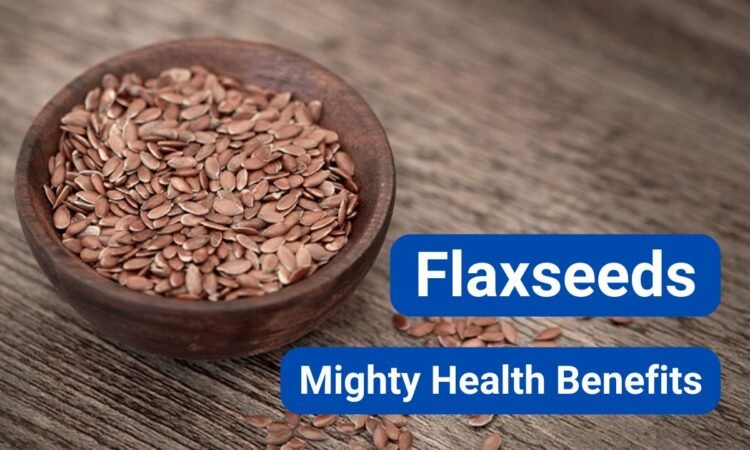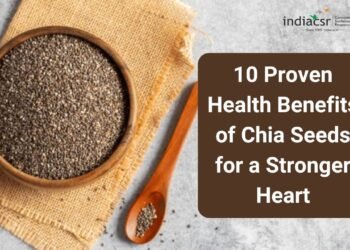Several studies have found that flaxseeds may help reduce high blood pressure, balance cholesterol levels, and improve heart function. For people who don’t eat fish, flaxseeds are a valuable source of omega-3s.
Ever feel like you’re doing your best to eat healthy, but something’s missing? Maybe you’re looking for that one ingredient that’s simple to add, easy to find, and loaded with benefits. Meet flaxseeds — one of nature’s most powerful superfoods.
These tiny brown or golden seeds have been used for thousands of years — even by ancient civilizations — not just for food, but for their medicinal properties too. Today, flaxseeds are enjoying a well-deserved comeback as a go-to ingredient for better digestion, glowing skin, heart health, and so much more.
Here, we’ll explore everything you need to know about flaxseeds — from nutrition and health benefits to how you can easily add them to your daily meals.
What Are Flaxseeds?
Flaxseeds, also known as linseeds, come from the flax plant (Linum usitatissimum). They are small, flat, and oval-shaped seeds with a slightly nutty flavor. You can find them in two common colors — brown and golden — and both types offer similar nutritional benefits.
What makes flaxseeds so special? It’s the unique combination of omega-3 fatty acids, fiber, plant-based protein, and antioxidants that sets them apart.
Key Facts About Flaxseeds
| Fact | Details |
|---|---|
| Scientific Name | Linum usitatissimum |
| Common Names | Flaxseeds, Linseeds |
| Colors Available | Brown and Golden |
| Taste & Texture | Mild, nutty flavor; crunchy when whole, smooth when ground |
| Main Nutrients | Omega-3 (ALA), fiber, protein, lignans, magnesium, vitamin B1 |
| Omega-3 Content | ~1.6 grams of ALA per tablespoon (10g) |
| Fiber Content | ~1.9 grams per tablespoon (ground) |
| Protein Content | ~1.3 grams per tablespoon |
| Antioxidants | High in lignans (800x more than most plant foods) |
| Heart Health | Supports lower cholesterol and blood pressure |
| Digestive Health | Promotes regularity, gut health due to fiber |
| Hormonal Support | Balances estrogen; helps with PMS and menopause symptoms |
| Weight Management | Helps curb appetite and increase fullness |
| Skin & Hair Benefits | Improves hydration, reduces inflammation, supports healthy glow |
| Blood Sugar Control | Slows sugar absorption, may aid insulin sensitivity |
| Best Form for Absorption | Ground flaxseeds (not whole) |
| Daily Recommended Amount | 1–2 tablespoons |
| Storage Tips | Keep ground seeds in an airtight container in the fridge |
| Vegan Egg Substitute | 1 tbsp ground flax + 3 tbsp water = 1 flax egg |
| Cautions | May cause bloating if consumed in excess; consult doctor if on medication or pregnant |
ALSO READ | Chia Seeds and Health: A Tiny Superfood with Massive Benefits
Nutritional Profile: Tiny but Mighty
Flaxseeds are incredibly nutrient-dense. Here’s what you get from just one tablespoon (about 10 grams) of ground flaxseeds:
- Calories: 37
- Fat: 3 grams (mostly healthy fats)
- Carbohydrates: 2 grams
- Fiber: 1.9 grams
- Protein: 1.3 grams
- Omega-3 (ALA): 1.6 grams
- Lignans: A rich source of antioxidants
- Vitamins & Minerals: Good amounts of vitamin B1, copper, magnesium, and phosphorus
Flaxseeds are naturally gluten-free and suitable for vegan and vegetarian diets.
Rich in Omega-3s for Heart Health
One of flaxseed’s biggest claims to fame is its alpha-linolenic acid (ALA), a type of plant-based omega-3 fatty acid. ALA is linked to reduced inflammation and a lower risk of heart disease.
Several studies have found that flaxseeds may help reduce high blood pressure, balance cholesterol levels, and improve heart function. For people who don’t eat fish, flaxseeds are a valuable source of omega-3s.
High in Fiber, Great for Digestion
Flaxseeds are a fantastic source of both soluble and insoluble fiber. This fiber content helps regulate your digestive system, prevent constipation, and support a healthy gut.
Soluble fiber helps soften stools and makes them easier to pass. Insoluble fiber adds bulk and keeps things moving through your intestines. Plus, fiber slows down digestion, helping you feel full longer — a huge win for those managing weight.
A Powerful Antioxidant: Lignans
Flaxseeds contain up to 800 times more lignans than other plant foods. Lignans are antioxidant compounds that help protect your cells from oxidative stress and may play a role in hormone balance and cancer prevention.
Some research has shown that lignans in flaxseed may reduce the risk of breast cancer and prostate cancer, thanks to their ability to mimic estrogen in the body and block certain hormone-related actions.
Balances Blood Sugar
Flaxseeds may help control blood sugar levels, especially in people with type 2 diabetes. The fiber content slows the release of sugar into the bloodstream, preventing spikes and crashes.
In a recent study, participants who ate flaxseeds daily showed improved insulin sensitivity and better blood sugar control. If you’re watching your glucose levels, flaxseeds could be a smart addition to your diet.
Supports Weight Management
Trying to shed a few pounds or maintain a healthy weight? Flaxseeds can help! Their high fiber and protein content keeps you feeling full for longer, which can curb unnecessary snacking and overeating.
Some studies have found that people who consume flaxseeds regularly tend to eat fewer calories overall and have better control over cravings. Plus, they add texture and taste to meals without adding too many calories.
Promotes Healthy Skin and Hair
Flaxseeds are rich in essential fatty acids that nourish your skin and hair from the inside out. Omega-3s help fight dryness, reduce inflammation, and support skin hydration. The antioxidants in flaxseeds can also help slow down the signs of aging.
Some people even use flaxseed oil topically as a natural moisturizer or hair mask, but the real magic happens when you consume them regularly.
Hormonal Balance, Especially for Women
Flaxseeds are often recommended for women because of their natural phytoestrogens (plant compounds that mimic estrogen). This makes them especially beneficial during menopause or for women dealing with PMS symptoms.
Research suggests that flaxseeds can help regulate hormonal fluctuations, reduce hot flashes, and even support fertility in some cases.
How to Use Flaxseeds Daily
Now that you’re convinced flaxseeds are worth the hype, how do you actually eat them?
Here are some easy ideas:
- Ground Flaxseeds in Smoothies: Blend a tablespoon into your morning smoothie.
- Add to Oatmeal or Cereal: Stir ground seeds into your breakfast bowl.
- Flaxseed in Baking: Add to muffins, pancakes, or bread for a fiber boost.
- Mix into Yogurt: Combine with fruit and honey for a tasty snack.
- Flax Eggs: Mix 1 tablespoon of ground flaxseeds with 3 tablespoons of water — a perfect egg substitute for vegan baking.
- Sprinkle on Salads or Soups: Add a spoonful to boost nutrition.
Note: Always grind flaxseeds before eating them. Whole flaxseeds often pass through your system undigested, meaning you miss out on all their health benefits.
Choosing and Storing Flaxseeds
- Buy whole seeds and grind them at home for maximum freshness.
- Store ground flaxseeds in the fridge or freezer to prevent spoilage.
- Choose organic flaxseeds when possible to avoid pesticide exposure.
Flaxseed oil is also available, but it doesn’t contain fiber or lignans, so it’s best used alongside ground seeds — not as a replacement.
Are There Any Side Effects?
Flaxseeds are generally safe, but here are a few things to keep in mind:
- Start with a small amount to avoid digestive discomfort like bloating or gas.
- Drink plenty of water, as the fiber content can be drying.
- If you’re pregnant, breastfeeding, or on medication, consult your doctor before adding large amounts of flax to your diet.
A Tiny Seed That Delivers Big Results
Flaxseeds may be small, but they pack a serious nutritional punch. Whether you’re aiming to improve your heart health, digestion, blood sugar, skin, or weight — these tiny seeds have something to offer. They’re affordable, easy to find, and simple to add to your favorite meals.
📢 Partner with India CSR
Are you looking to publish high-quality blogs or insert relevant backlinks on a leading CSR and sustainability platform? India CSR welcomes partnerships for guest posting, sponsored content, and contextual link insertions in existing or new articles. Reach our highly engaged audience of business leaders, CSR professionals, NGOs, and policy influencers.
📩 Contact us at: biz@indiacsr.in
🌐 Visit: www.indiacsr.in
Let’s collaborate to amplify your brand’s impact in the CSR and ESG ecosystem.
(India CSR)























